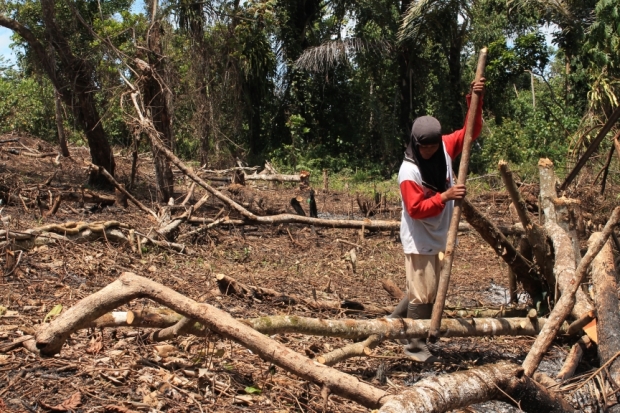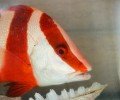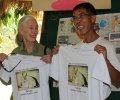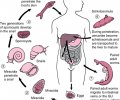Gene-Welfare Coevolution
I saw my dog Goi sitting in front of the Supreme Judge of Afterlife. Goi was rewarded for his good karma (guarding my house well and greeting me always when I was coming home): reincarnation as a top predator of the food pyramid in his next life. He could choose between a transmigrant (a human being) and an eagle (a bird). I had known what he was going to choose. Human being is far above bird on the evolutionary tree. It would be odd or even stupid if one turned down a higher status offer—bird is lower than dog on the tree, anyway. As I loved him much, I had to stop him from making that huge mistake, but then my alarm clock rang me up.
Bejo and I have come to Napu Valley for starting something new: he a life, I a project. We were around one hundred meters behind his new house, sitting on one of the felled trunks. We exchanged questions—mine was much more than his—about the present and the past. He asked me what brought me here. I gave him a reasonable answer, but, of course, I did not tell him that I had come to save trees and wildlife because what he was doing was precisely the opposite of my intention. He has been clear-cutting the trees along the river behind his house since he had come here three months ago.
While we were chatting, his wife was busy planting corn seeds. She dug holes between the felled logs and branches—most of them were half burned—by a wooden stick and covered them with the ash of burnt tree parts. Under the blazing heat of the Sun, she bent hundreds of times every day. She had planted various seeds for about two months. Labor division by gender seems universal: cutting trees is man’s job, planting is woman’s. Both jobs are tough because of the ancient tools they still use: axe and wooden stick.
It turned out that Bejo and I share some similar experience. We are wanderers. I have jumped—like General McArthur’s frog jump during the World War II—from island to island in eastern Indonesia; he in western Indonesia. However, we have moved around for different reasons: I for adventure, humanitarian deed, and achievement; he for survival.
Bejo was born in Pemalang, north Central Java, in 1966. Pemalang has been over-populated for a long time; land is too small for supporting life of most families, including Bejo’s family. For this reason, Bejo joined his relatives in Jakarta even before 15. He worked in the road, building, and other infrastructure projects; he lived in the shanty along the railroad, riverbed, or under the highway or bridges; the wage was not enough for renting even a simple room. As a squatter, he had to move around avoiding the raids of municipal officers. They might be rude, but comparing with the thugs to whom he had to pay regular fee for ‘protection’, these officers were not too horrifying. Failing to pay them might cause him some bruises or even bone fractures.
Having no saving and tired of being chased by the officers and thugs for more than ten years, he joined his friends working in the palm oil plantation in Jambi Province, Sumatera Island. This job enabled him save some money, and he used it for going home to Pemalang to marry one of his village girls. He took his wife to Jambi and had their first boy there.
Although he could save some money, life was not easy in the plantation, and rather boring. They moved to Pekanbaru, the capital of the Province; Bejo back worked on construction projects; his wife sold fried bananas and some other snacks. They had their second child here.
Construction labor was a seasonal job: project completed, work gone; the environment is dirty and dangerous—the employers never care of the health and safety of their workers—and it also needs fitness: if do not come because of the sickness, you get no pay. For this reason, Bejo and his family moved back to Jakarta.
With some saving from Sumatera, Bejo sold various little things by the streets. Again, he played cat-and-mouse with the municipal officers. Getting tired of his merchandise confiscated by the officers and feeling insecure living with the thugs, Bejo accepted the invitation from one of his friends in Berau, Borneo Island. Here he helped his friend with his ‘recycle’ business: collecting plastic and other material wastes and selling them to Java. The third child was born.
With three children to support, the income had rarely been enough, even for basic food and simple shelter. His two older children had to leave junior school. And, at 17, the eldest got married and soon had a child, but no job. Then Bejo decided that urban life was unbearable; he wanted to try something different. He joined the transmigration program to Napu Valley, Central Sulawesi.
Like almost all transmigrants, Bejo had no idea what the Promised Land looked like. He had heard both success and failure stories of transmigration. However, he believes that with working hard, his future will be a success story. He is almost right; hard working is only one out of two success determinants. The other one is bejo, or luck in Javanese—one of the most common Javanese name for lower class men; parents often change their son’s name to bejo if he keeps sick during his childhood.
In Napu Valley, there are two transmigration sites with different fates. The first one is Mekar Sari; here most of the transmigrants are better off. The second is Siliwanga; the remnants of original transmigrants (about 20%) live barely above subsistence level. Both groups of transmigrants have been hard workers, but the result is so contrast. Mekar Sari is a fertile land with enough water for irrigation; Siliwanga is dry grassland.
The prospect of possessing one-hectare (around one soccer field) farmland and a nice house, and receiving food support from the Government for one year was exhilarating. Bejo was appointed as the head of the group from Pemalang (10 families); the other two groups are from Demak and Bali. The Pemalang and Demak groups embarked from Semarang Harbor and disembarked in Palu Harbor three days later. From there, they were packed into trucks and headed to Napu Valley. The first misery started; the bad road shook the open trucks full of people for five hours.
They arrived in Watutau, the capital of the Lore Peore District, late in the afternoon. Their destination was still three kilometers away, but the trucks could not go any further. A bridge was not ready for car to pass. They left their luggage in the community center; with some hand-carried bags and mats, they continued to Rodo-rodo, the transmigration site. The second misery: the clay path was slippery, up-and-down, and it was dark; the air was cold because the altitude is 1150 meter above sea level; and they were hungry.
It took them one hour to reach their new ‘home’. The confusion then occurred because the house assignment had not been done yet. Bejo, as the leader, told his people to stay in any houses that were not so dirty. As they were exhausted, they did not complain much about the unfurnished houses and the lack of electricity and latrine. They slept on the mats, crowding to fight against the cold air and floor.
Next morning, they could see the houses and surrounding better. They had been finished two years before; a legal case on the land ownership with the locals had prevented the site to be occupied sooner. The wooden walls and floors had many holes from the shrunk planks—installed when still wet to rush the construction and save money. There was no ceiling but tin roofs; we can see the sky through a number of holes on them, and the floors beneath these holes are wetter than the surrounding: the rain drips.
All houses were under siege by the bush, at least two years old. That day Bejo organized his group to pick up the luggage from Watutau and to assign house for each family. Bejo’s family was entitled three houses; one for Bejo, wife and daughter; the other two for both of his sons; he registered his single son as married for the extra house.
The farmland is not assigned yet, even until now. The transmigration officials have shown the location of the lot. It is a dry land covered with weeds and has never been cultivated. According to Bejo and a senior local, the soil is too acid for any plants but cassava; even the cattle do not eat its weeds.
Except for a mosque and a small community center, no public facility has been built. The closest school is in Watutau, 3 kilometers away. The students have to walk for one and a half hour round trip every day. If it rains, most of them are always wet and cold arriving at school.
The most difficult problem could be the clean water. Every house has a well, but it is only two meter deep; I did not see any water inside the wells I checked. “It has rained for the last three days,” Bejo told me. The beautiful dream started to fade away; the hope dwindles.
Everybody started to work hard preparing the yard for crops, corn and cassava. They have to do it as soon as possible because the Government will stop giving them food (rice, dry fish, and frying oil) after one year. There is no chance rice plant will grow well here: infertile dry land. However, Bejo is still optimistic.
The transmigration site is located by a tributary of the Lariang River, 100 – 200 meter away. Its bank is teeming with trees; in fact, this ‘green snake’ crossing the valley that breaks the monotonous yellow landscape of the South Napu Valley. Without asking permission from the Government and locals, the transmigrants have begun clearing the forest along the riverbank. Feeling guilty for not providing decent location and facility, the officials have done nothing to stop this deforestation.
Bejo and his family have planted hundreds of cacao and coffee saplings on the clearing of the forest. “I want to have 10,000 trees of cacao and coffee trees,” he told me. Too dreamy, I think, because I just had interviewed some transmigrants at the other site in the Valley. Having settled for almost four years and their land is larger and better than Rodo-rodo, they only have 300 – 400 trees. From selling cacao and coffee harvested from these trees, they are able to stay above subsistence level, but are still not considered rich. Bejo must have been tired of absolute poverty and cannot wait to enjoy prosperity in his old age.
Although his life has been extremely hard, Bejo is not unique at all. I used to serve and live with the transmigrants in Papua. Many of them had moved around in urban areas before ending up in Papua. During this nomadic period, the urbanites get married and have children, enlarging the band size; they rarely experience the ‘empty nest’ phenomenon of modern families of higher class. Transmigration is a hope—a promising future according to the campaign by the Government. The Eden.
Life is not easy either for me, but having known with so many Bejos, I feel my life is not too hard. Billions of people have harder lives than mine. Just calculate how much time each adult spends on sustaining their life—activities for buying or producing survival food and simple clothes or on doing nothing because no job is available. Bejos spend more than 90% of his time (minus sleeping time) on doing both. By comparison, I still have time to do non-job activities I like (sport, reading, and writing for instance), help people expecting nothing in return—though grateful gaze is much appreciated, honestly—whenever I see the opportunity, and enjoy holidays and entertainment regularly.
Achievement, joy, happiness, or even satisfaction is absurd to Bejos. Their life, as I see, is to survive and to reproduce. Bejos’s life is therefore not different from animal’s! It means they do not experience gene-welfare coevolution but genetic evolution only. Why does humanity leave behind welfare evolution?
When I worked for a rich company—one year only—I often stayed in five star hotels. The room is luxurious and energy consuming: bulbs (10), refrigerator, television set, TV cable decoder, video player, modem, air-conditioner, curtain control, key control, microwave, hair dryer, shaver, shower, heater, etc. The power consumed by one hotel guest can be used by 100 people living in the rural area in Napu Valley, Sulawesi. And one hotel could have 400 rooms. It means the electricity for one hotel in Jakarta will power the lights for 40,000 people, the population of the areas along the west margin of Lore Lindu National Park, Sulawesi.
Do the hotels have to provide so much energy to their guests? Surely, not. But transferring the energy—one of many resources have to be distributed fairly—saved from rich urbanites to poor urban and rural people needs a strong commitment from the Government, private companies, and individuals. It is feasible and possible only if humanity can transform empathy for others into real action, beyond academic and political courses.
Animals are homogenous in each own species. Except for social animals—ants, termites, wasps and bees—individual animal does the same things: foraging and breeding. Modern human beings are heterogeneous; socioeconomically, they are stratified by class: lower, middle, and upper. The upper class have never concerned of not having survival food: they do not have to forage. They spend most of their time on creative and/or intellectual activities that lead to achievement—high status or fame is most likely the final goal—and on leisure. A proportion of the middle-upper class people decide not to have children for various reasons: they do not reproduce on purpose. The people from both classes have reached full-blown evolution of Homo sapiens: physic, intellect, culture, and welfare. In short, they are modern human beings, who are not worried much about having no food and shelter if being out of job or business for a year or longer. In contrast, the lower class like Bejos, if they are sick for a few days, the whole family will be in trouble; Bejos have to borrow money for buying rice from his neighbors or friends.
When we ask Bejos about their life goals, almost invariably their answer is ‘to raise children to adulthood’. I am afraid that if animals could speak, they would give the same answer. And, most of them ‘achieve’ the goal, unless human beings or other predators kill their offspring. There is a word missing in the Bejos’s answer to differentiate between human and animal: ‘happily’. Most Bejos reproduce junior Bejos. Both generations lack adequate dependable and quality food, decent housing, clean water, health care, and education; they rarely do sport and unlikely go for vacation. I do not think reproducing another Bejo is achievement for Homo sapiens; in fact, it is a failure on breaking the vicious ring of poverty.
The Asmat and other modern hunter-gatherers I used to live with were poor too, maybe poorer than Bejos if we value their life by rupiah or dollar. They also move around but in the same region: no cultural shock, no need for adaptation. They live in simple stilt houses but, unlike Bejos, they own the houses—nobody breaks their houses down for legal reason. Again, unlike Bejos, they have abundant food most of the time—the gift from Nature—and they therefore have plenty of leisure time. The modern hunter-gatherers—evolutionary scientists study them for conjecturing how our human ancestors lived during pre-Neolithic era, before the invention of agriculture about 10,000 years ago—have better quality of life than Bejos. In fact, I still dream to have a life like theirs, minus the malaria and other tropical diseases.
I sometimes, especially during nothing else but thinking can be done, muse the major decisions I have made in my life since I have that power—I had no power to reject the separation from my mother by my father when I was five years old. Running away from my grandmother in Jakarta was a right decision, I am sure (my previous post), but filling in correct answers in the admission test for medical school started the chain of blunders:
giving up to my parents’ pressure to go to medical school instead of staying at the agriculture institute;
choosing UNC instead of Yale or Johns Hopkins;
majoring in environmental health instead of tropical ecology; etc.
I did not do well with my life, I often ponder, and I wish my life were like a computer system. When fixing individual trouble—viruses, worms, Trojans might have been the culprits—fails to keep the computer running optimally, I can format the hard disk, re-setup the operating system, and reinstall the necessary applications. It will become a new and clean system. I will not do the previous mistakes that had caused the troubles. However, having travelled and lived in many places, including USA, Peru, Singapore, and Australia, and observing the lives of lower class people, serving and living with some of them for years, I think my life is not a failure. I still have some quality time—in addition to the hard one—in my life; in contrast, they live to sustain life: very hard and boring, which often makes me wonder why they still want to live longer.
I asked Bejo if he had seen any wildlife when he was cutting the forest. He said ‘never’ and it relieved me. The urge of to stop him from clearing the forest was much less. No big wildlife’s habitat—at least tarsier’s and macaque’s because I asked him these animals specifically—would lose. I will do nothing because I am not ready yet to provide them solution to their dilemma: “If we do not cut the trees now, we will no money to buy food for our children next year.” For the time being, I can just cry to watch the destruction of Mother Nature. I do not have any resource that enabling me to stop those unfortunate people from clearing the forest; however, I have had a plan to control the damage, if I am lucky with fundraising on the Schistosomiasis eradication program. However, I have started this effort with offering a transmigrant carpenter to make my bed and office desk, thanks to my foundation donors.





